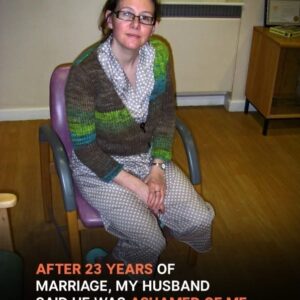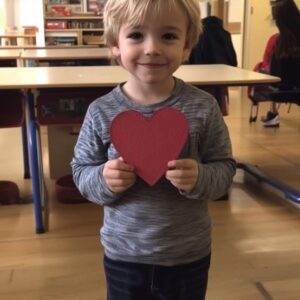Family dynamics can sometimes be as complex and painful as any external hardship we face. I’m Nick, the middle child caught in the crossfire of favoritism that had divided our family for years. Growing up, it always felt like our parents’ affections were skewed—our younger sister Mia was their “miracle baby,” celebrated for surviving a life-threatening illness, while my older sister Brit was overlooked, her achievements and joys barely acknowledged. Over time, Mia not only absorbed that favoritism but began to actively take over aspects of Brit’s life—stealing her dreams, her happiness, and even her boyfriend. But the tide finally turned during a family gathering, when Brit, pregnant and hopeful for a fresh start, faced Mia’s latest attempt at usurping her life. In that moment, our entire family, long divided by envy and neglect, finally found the strength to stand up for what was right.
This is our story—a long, winding journey of betrayal, heartache, resilience, and ultimately, a rediscovery of love and unity. It’s a narrative about how years of imbalance and unfairness were challenged and how, when the whole family finally fought back, the truth about what truly matters came to light. In sharing our story, I hope to inspire others who have felt overlooked or diminished within their own families to find their voice, reclaim their worth, and foster an environment where every member is celebrated.
A Childhood of Unequal Affection
I remember growing up with a sense of quiet despair, a feeling that no matter how hard I tried, I would always live in the shadows of my sisters. Our family was split into two distinct worlds. On one side was my younger sister Mia, the radiant “miracle baby” who, against all odds, had overcome a life-threatening illness as an infant. From that moment on, she was the golden child—cherished, celebrated, and often given everything she asked for. Our parents would beam with pride every time Mia achieved something, whether it was winning a school award or simply getting a perfect score on a test. The family dinners and special outings always seemed to revolve around her.
On the other side was my older sister Brit. She was the quiet, sensitive soul with a passion for art and a heart full of dreams. Brit’s talent for drawing and her gentle nature were evident from a young age, yet whenever she showcased her artwork—like that detailed family portrait she lovingly crafted—our parents would barely spare her a glance. I vividly recall a particular day when Brit excitedly presented her drawing to our mom, saying, “Look what I made, Mom!” Only to receive a distracted, “That’s nice, dear,” as Mom immediately turned her attention to Mia’s latest soccer achievement.
It wasn’t just the little things. Over time, I observed that every time Brit accomplished something remarkable—earning top grades, excelling in a hobby, or even just expressing herself through art—Mia’s achievements were celebrated with lavish gifts and public accolades. Mia’s successes, no matter how trivial, were always the highlight of our parents’ day, while Brit’s efforts were met with indifference or even subtle criticism.
There were moments, even in my early childhood, when Brit’s eyes would fill with tears as she silently questioned her worth. I remember her once whispering, “Am I invisible, Nick?” while looking into the mirror. That question, so raw and painful, has haunted me ever since. Even though I was too young to fully understand the depth of her hurt, I knew something was terribly wrong. Our family was divided not just by age, but by a deep-seated imbalance that left Brit feeling unloved and unimportant.
The Years of Growing Resentment and Unspoken Rivalry
As we moved into our teenage years, the imbalance in our family became even more pronounced. Mia’s desire to outshine Brit grew from playful competition to something far more sinister. It wasn’t enough for Mia to simply receive attention; she actively sought to undermine her older sister. There were incidents that remain etched in my memory, moments that painted a stark picture of the envy that had taken root in Mia’s heart.
I recall one afternoon when Brit was quietly working on a drawing in her room—a drawing that showcased the warmth of our family, with each member lovingly depicted in detail. Brit was proud of her work, yet when she shared it with our parents, they barely glanced at it before congratulating Mia on winning “Participant of the Week” in soccer. The contrast was stark: Brit’s artistic passion was treated as a mere hobby, while Mia’s athletic achievement was celebrated with a homemade cake and loud praises.
The rivalry intensified with more personal attacks. Mia once stole Brit’s crush, simply because she could, leaving Brit heartbroken and isolated. On another occasion, when Brit had gone to sleep, Mia secretly cut her hair—a prank that left Brit devastated the next morning. Each incident chipped away at Brit’s self-esteem, leaving her to wonder why she wasn’t enough in the eyes of our parents.
I tried to be a mediator, a voice of reason between the two sisters, but even I struggled to comprehend the depth of the favoritism that had taken over our family. Our parents, blinded by their unwavering adoration for Mia—their “miracle child”—never recognized the emotional toll their bias was taking on Brit. They dismissed her pain as teenage drama, never realizing that the seeds of resentment were being sown in silence.
It wasn’t just the children who were affected. I, as the middle child, was caught in a constant tug-of-war between two extremes—while I longed to support Brit and see her shine, I also felt the pressure to conform to our parents’ expectations. I found myself questioning my own worth, wondering if I too would one day be sidelined in favor of Mia. The dynamics within our family were complex and fraught with unspoken rivalries, leaving me with a profound sense of injustice and sorrow.
A Pivotal Family Gathering: The Breaking Point
After years of enduring this imbalance, our family reached a breaking point during a long-anticipated family gathering. Brit, who had spent years quietly nurturing her dreams and overcoming the hurt of feeling overshadowed, returned home pregnant and hopeful. It was meant to be a joyful reunion—a chance for our family to come together and celebrate the new chapter in her life. I remember the anticipation in the air as we all gathered around the dinner table, each person carrying their own mix of expectations and unresolved emotions.
The evening began civilly enough. Our parents, ever eager to showcase their favoritism, showered Mia with excessive praise, oblivious to the undercurrents of tension that flowed beneath the surface. Mom’s voice was effusive as she greeted Brit, “We’re so happy to have you back, sweetheart,” while her eyes betrayed a fleeting glimpse of guilt, quickly masked by the same old adoration for Mia.
Mia, with her characteristic false sweetness, sat quietly, twirling the stem of her wine glass as she watched everything unfold. The atmosphere was thick with anticipation—everyone was waiting for the moment when Brit’s long-suppressed pain would finally be acknowledged.
It wasn’t long before the conversation took a turn. In a tone that dripped with insincere sympathy, Mia began to address Brit. “Brit, I know it must be so hard for you, especially seeing your ex as my husband. I admire your courage for showing up,” she drawled, her words designed to sting rather than console.
The room fell silent. Brit’s face paled, and I could see the hurt in her eyes. Pit, Brit’s partner, clenched his jaw in anger, and even our parents looked taken aback by the audacity of Mia’s comment. It was in that charged moment that our cousin Helen, known for her candor and fierce loyalty, stood up and raised her glass.
“Actually, I’d like to toast Brit,” Helen declared. “Brit, you have been the rock of this family. You helped me through college, provided a safe haven when I had nowhere to go, and your kindness and generosity have never gone unnoticed. You are the backbone of this family, and tonight, we celebrate you.”
One by one, relatives and cousins chimed in with heartfelt tributes—stories of Brit’s compassion, her unwavering support, and the many times she had put others before herself. Each word was a powerful rebuke to the years of neglect and favoritism. It was as if, for the first time, the entire family had come together to honor the quiet strength and enduring love that Brit had always embodied.
Mia, caught off guard by the outpouring of praise for her older sister, fell silent. Her face, once filled with haughty superiority, turned red as she realized she was no longer the center of attention. In that moment, the balance of our family shifted. The truth that Brit was truly cherished and indispensable was now undeniable, and the sting of Mia’s past actions was laid bare for everyone to see.
The Unraveling: Confronting Years of Favoritism
In the aftermath of that emotionally charged evening, I found myself reflecting deeply on the years of favoritism that had divided our family. As the middle child, I had always been a silent observer of the relentless bias that had allowed Mia to steal not just opportunities but also the very essence of what made Brit shine. I remembered the small moments from my childhood—the way our parents would barely notice Brit’s achievements while showering Mia with gifts and praise. I recalled the times when Brit’s heartfelt attempts to share her talents were met with indifference, and the pain in her voice when she asked, “Am I invisible?”
These memories, once buried under the routine of family life, now resurfaced with startling clarity. I realized that the years of unchecked favoritism had not only stifled Brit’s spirit but had also created an unspoken divide that threatened to tear our family apart. The evening’s revelations were a wake-up call—a final push that forced us all to confront the reality we had long ignored.
In a series of candid conversations with other family members, I learned that many had harbored similar frustrations. Cousin Helen, who had stood up for Brit that night, confessed that she had often felt that Mia’s behavior overshadowed the contributions of others in the family. Another cousin, Sarah, recalled a time at prom when Brit had comforted her after a disastrous date—an act of kindness that had gone unrecognized because Mia’s antics had stolen the spotlight once again.
The more I listened, the more I realized that our family had been living under the illusion that favoritism was harmless. But it wasn’t. It had sown seeds of resentment, jealousy, and division that threatened to fracture our family permanently. The love that should have bound us together was being eroded by a constant, unspoken competition that pitted one sibling against the other.
A Turning Point: The Family’s Collective Awakening
The events of that family dinner marked a turning point—a moment when the truth could no longer be ignored. The heartfelt tributes to Brit, combined with the unmistakable silence that followed Mia’s failed attempts to reclaim the spotlight, signaled that something had changed. For the first time in years, our entire family had come together to honor the quiet strength and unwavering kindness of our older sister.
That night, as the dinner ended and we all dispersed into the cool evening air, I felt a mixture of relief and sorrow. Relief that Brit had finally been recognized for who she truly was—a pillar of strength, compassion, and selfless love. Sorrow for the lost years of neglect and the deep wounds that had been inflicted by favoritism. Yet, amid the complex emotions, there was also hope—a hope that this moment of collective awakening could be the catalyst for lasting change.
Over the following weeks, conversations within the family began to shift. Our parents, who had long been blind to the imbalance, started to see the consequences of their actions. They listened, for the first time, to the quiet voices of those who had been sidelined. My father, who had once dismissed Brit’s feelings as trivial, now found himself apologizing for not recognizing the hurt he had caused. My mother, with tears in her eyes, admitted that she had always favored Mia, not out of malice, but out of a misguided belief that the miracle baby deserved extra attention.
It was a slow process—one that required humility, forgiveness, and a willingness to change. But as the days turned into weeks, the cracks in our family’s façade began to mend. Brit, who had spent years suppressing her pain, started to open up. She shared her feelings with us, and we listened, truly listened, for the first time. In doing so, we began to understand that love is not a zero-sum game. It is not about one sibling shining brighter than the other, but about each person’s unique contributions to the family tapestry.
Rebuilding the Bonds: Steps Toward Healing and Unity
The journey toward healing is never straightforward. It involves acknowledging the past, confronting painful truths, and taking deliberate steps to build a more equitable future. Our family’s path was no different. In the wake of that transformative family dinner, we embarked on a collective effort to rebuild the bonds that had been weakened by years of favoritism and neglect.
Open Dialogue and Honest Communication
One of the first steps we took was to initiate regular family meetings—a space where everyone, from the youngest to the oldest, could voice their feelings openly and without judgment. These meetings were not always easy; emotions ran high, and old wounds were reopened. But they were essential for clearing the air and fostering a sense of unity. We discussed our individual experiences of feeling overlooked and began to understand how our actions had inadvertently contributed to the imbalance. These candid conversations laid the groundwork for a more honest, empathetic family dynamic.
Redefining Family Traditions
We also began to redefine our family traditions, ensuring that every member felt valued and included. No longer would celebrations revolve solely around Mia’s achievements. Instead, we dedicated special occasions to celebrate Brit’s milestones, acknowledging her contributions and the love she had always given selflessly. Family dinners, birthday celebrations, and even small get-togethers were now infused with a renewed sense of purpose—a commitment to honor each person’s unique journey and to celebrate the bonds that truly mattered.
Embracing Individual Growth
As our family started to heal collectively, each of us also embarked on personal journeys of growth and self-discovery. I made a conscious effort to support Brit in pursuing her passions—whether it was art, music, or simply finding her voice in a world that had long silenced her. I encouraged her to join a local art class, where she could share her talent with others and regain a sense of pride in her abilities. At the same time, I reached out to Mia, trying to understand the root of her behavior, though the path to reconciliation with her would be long and fraught with challenges.
I also took time to reflect on my own experiences growing up in a divided household. I sought therapy, not only to process the pain of favoritism but to learn how to advocate for fairness in my own relationships. Through counseling, I discovered that healing requires both self-compassion and the willingness to forgive—even when forgiveness is hard to grant.
The Ripple Effects on Our Extended Family
The transformation within our immediate family began to ripple outward. Our parents, who had once been the architects of favoritism, started to acknowledge their shortcomings. They attended family therapy sessions with us, eager to understand the impact of their actions and to learn how to support each other more equitably. My cousins, who had long witnessed the dynamics between Brit and Mia, began to offer their perspectives and support for a more balanced approach to family life. It was a collective awakening—a realization that for our family to thrive, every voice needed to be heard, and every member had to feel cherished.
A New Era of Understanding and Acceptance
As the months turned into years, our family underwent a profound transformation. Brit, who had once felt invisible and undervalued, began to emerge as a confident, self-assured woman. With the support of her loved ones, she rediscovered her passion for art and started showcasing her work in local galleries. Her journey from silence to self-expression was nothing short of inspirational. Meanwhile, Mia, forced to confront the consequences of her actions, gradually began to understand the true meaning of empathy and respect. It wasn’t an overnight change—old habits die hard—but the seeds of transformation were firmly planted.
For my part, I learned that sometimes, the only way to mend a fractured family is to allow the truth to set you free. The pain of favoritism had left scars, but it also paved the way for growth, forgiveness, and a redefined understanding of what family truly means. Our family, once divided by jealousy and neglect, slowly found its way back to unity through open dialogue, shared experiences, and the collective will to heal.
I became an advocate for balanced family dynamics, speaking out about the importance of recognizing each person’s value and ensuring that no one is left behind. I wrote articles, participated in panel discussions, and even organized workshops aimed at helping families navigate the complexities of favoritism and emotional neglect. The work was deeply personal—it was about ensuring that no other family would have to endure the same pain I had experienced.
The Journey Toward Forgiveness and Lasting Change
Forgiveness is one of the hardest lessons to learn, yet it is also the most liberating. My journey taught me that while it is essential to stand up for oneself, it is equally important to forgive—not for the sake of the offender, but for your own healing. Forgiveness allowed me to let go of the bitterness that had once threatened to consume me, and it paved the way for a future defined by compassion and mutual respect.
I learned to forgive our parents for their unintentional bias, even though their actions had caused deep wounds. I forgave Mia for the countless ways she had overshadowed Brit, recognizing that her behavior stemmed from her own insecurities and the undue pressure of being the family’s “miracle baby.” And I forgave myself for the years I had remained silent, for the times I had allowed favoritism to go unchallenged. Each act of forgiveness was a step toward reclaiming my power and reshaping my family’s future.
Personal Reflections: Finding Strength in Vulnerability
Looking back on those tumultuous years, I realize that every hardship, every tear shed, and every painful memory has contributed to the person I am today—a person who values authenticity, equality, and the transformative power of love. I have learned that the path to healing is not a straight line, but a winding road filled with ups and downs. Yet, each twist and turn has brought with it valuable lessons in resilience and self-worth.
One of the most profound insights I gained was that true strength lies in vulnerability. By opening up about our family’s struggles—by acknowledging the deep-seated pain that favoritism had caused—we were able to forge a new path forward. Vulnerability is not a weakness; it is the foundation upon which real, lasting connections are built. I began to share my story not only with my family but with anyone who would listen, hoping that my journey might inspire others to confront their own truths and to fight for a more equitable, loving family environment.
I also learned the importance of trusting my instincts. There were times when I doubted myself, wondering if I was overreacting or if I should simply let things be. But the moment I finally stood up and voiced my concerns, the tide began to turn. Trusting my inner voice, I realized, was key to reclaiming my identity and ensuring that my voice—my worth—was never again overshadowed by favoritism or neglect.
The Ripple Effects: Impact on Our Extended Family and Future Generations
The transformation that took place within our immediate family soon began to influence our extended family as well. Our parents, who had once been blind to the imbalance, started to see the long-term consequences of their favoritism. They began attending family therapy sessions with us, striving to understand the pain they had unintentionally caused. This collective journey toward healing not only improved our relationships but also set a powerful example for future generations.
My cousins, siblings, and even distant relatives began to reflect on their own family dynamics. The conversations we had—about fairness, recognition, and the importance of love—sparked a broader dialogue about how we, as a family, could move forward with more empathy and respect for one another. It was a ripple effect that showed even deep-seated habits and prejudices could change when confronted with truth and vulnerability.
I realized that our story was not just about one family’s struggle with favoritism; it was a microcosm of a larger societal issue. Many families face similar challenges, where one child is inadvertently elevated above the others, leading to a cascade of emotional consequences that can affect everyone involved. By sharing our experiences and the steps we took to heal, I hoped to contribute to a broader conversation about family dynamics and the importance of nurturing every member’s potential.
A Vision for the Future: Building a Legacy of Equality and Love
Today, our family stands at a new beginning—a time when the shadows of favoritism and neglect are slowly being replaced by the light of unity and mutual respect. Brit, once the quiet and overlooked elder sister, has found her voice and is celebrated for her unwavering kindness and resilience. Mia, who had long thrived on the attention of our parents, now faces the consequences of her actions and is forced to reckon with the impact of her behavior on those she once belittled.
Our parents, too, have undergone a transformation. They have come to understand that true family is not built on favoritism or superficial praise, but on the recognition of each individual’s inherent worth. Their journey toward acknowledging past mistakes has been painful, yet it has opened the door to a more balanced, loving future for all of us.
As I continue to reflect on my own path—one marked by painful decisions, hard-won independence, and the rediscovery of self-worth—I am filled with a sense of cautious optimism. The choices I made, though difficult, have led me to a place where I can truly be myself. I no longer settle for being overlooked or undervalued, and I strive every day to build a legacy defined by equality, honesty, and unwavering love.
I have come to see that the process of healing is ongoing. Each day offers new challenges and opportunities to learn, to forgive, and to grow. I remain committed to creating an environment where every family member feels cherished, where open communication is the norm, and where love—genuine, unconditioned love—remains the guiding force.
The Road Ahead: Continuing the Journey of Reconciliation and Renewal
The journey of healing and rebuilding our family is far from over. Every step forward is a reminder of the challenges we have overcome and the work that still lies ahead. I continue to attend therapy sessions, engage in heartfelt conversations with my family, and participate in community initiatives aimed at promoting equality and understanding. These efforts are not just about mending old wounds—they are about creating a future where the mistakes of the past are transformed into lessons that empower us to live better, more fulfilling lives.
I now advocate for open dialogue and shared responsibilities in all relationships. I speak at local events, write articles about family dynamics, and encourage others to challenge long-standing biases that diminish the value of any one member. My hope is that by sharing our story, others will be inspired to stand up for themselves, to demand the respect they deserve, and to build families where every member is celebrated.
I also look forward to a future where our family traditions evolve to reflect our new understanding. We have started creating rituals that honor every individual’s contributions—whether it’s celebrating Brit’s artistic talents, recognizing Mia’s journey toward self-improvement, or simply enjoying moments together without the shadow of past grievances. These traditions, though new, are a testament to the resilience and unity that can emerge from even the deepest wounds.
Reflections: Lessons in Self-Worth, Equality, and Unconditional Love
Reflecting on my journey from a marriage defined by imbalance to a life of independent strength, I have learned many valuable lessons that I now hold dear:
- Mutual Effort Is Non-Negotiable: A partnership is only as strong as the shared effort of both parties. True love requires that both partners contribute equally, not only in material terms but in emotional support and domestic responsibilities.
- Setting Boundaries Protects Your Worth:Establishing and maintaining clear boundaries is essential for preserving self-respect. I learned that I must always prioritize my well-being, even if it means making tough decisions.
- Self-Worth Comes From Within: My value is intrinsic. I deserve to be loved and respected for who I am, not just for what I provide. Reclaiming my independence was the first step toward recognizing my own worth.
- Courage to Change Leads to Growth:Change, though painful, is often necessary for personal growth. Embracing new beginnings, even when they challenge the status quo, can lead to a more fulfilling life.
- Honest Communication Is the Foundation of Healthy Relationships: Open, honest dialogue is crucial for resolving conflicts and building trust. I now encourage everyone to speak their truth, no matter how difficult it may be.
- Forgiveness Is a Gift to Yourself:Forgiveness frees you from the burden of resentment. It is not about excusing hurtful behavior, but about reclaiming your own peace and moving forward.
- Community Support Is Invaluable: No one should face life’s challenges alone. The support of friends, family, and community groups can provide strength and perspective during even the darkest times.
- Every Ending Is a New Beginning: The end of one chapter often marks the start of another. Embracing the possibility of a fresh start allows you to build a future defined by hope, resilience, and authentic happiness.
- Empowerment Begins with Self-Advocacy:Standing up for yourself is the first step toward a life where you are truly valued. Never settle for less than what you deserve.
- Redefining Family Means Embracing Everyone’s Unique Value: A family is not defined by favoritism but by the love, support, and commitment that binds its members together. Every individual deserves to be seen and celebrated for who they truly are.
A Future Filled with Promise: Moving Forward with Confidence and Compassion
Today, as I look back on the journey that has reshaped my life, I am filled with a profound sense of gratitude and empowerment. The decision to walk away from a relationship that left me exhausted and unappreciated has led me to a future where my self-worth is the cornerstone of my existence. I now live in a space that reflects my true self—a life built on independence, honesty, and the unwavering commitment to my own happiness and that of my children.
I continue to share my story, not as a cautionary tale of betrayal and imbalance, but as a celebration of the strength that comes from reclaiming your life. Every day, I strive to build a future that honors the lessons of the past while embracing the promise of new beginnings. My journey has taught me that true empowerment lies in the courage to be yourself, to speak your truth, and to never settle for anything less than what you deserve.
As I move forward, I am committed to fostering an environment where love, respect, and open communication are the guiding principles. I am passionate about advocating for balanced relationships, supporting others who have faced similar struggles, and building a legacy of genuine care and understanding for future generations. My hope is that my story will serve as an inspiration—a reminder that even in the face of overwhelming challenges, the power to change your life begins with a single, brave decision.
Conclusion: A Journey of Empowerment, Self-Discovery, and Unyielding Hope
The path from a marriage burdened by unrealistic expectations to a life defined by self-respect and independence is one fraught with pain, uncertainty, and profound personal growth. My journey—marked by the pivotal moment when I refused to have a third child and ultimately chose to reclaim my life—has been a testament to the transformative power of self-worth and the courage to stand up for oneself. I have learned that true love is not measured by the number of children you have or the material benefits you receive, but by the mutual respect and equality that form the foundation of any healthy relationship.
Today, I live a life that is authentically mine—a life where I prioritize my well-being, nurture my passions, and create a stable, loving environment for my children. Every challenge I faced, every tear shed, has contributed to the resilient, empowered woman I am now. My story is a reminder that no matter how painful the journey, every ending is merely the start of a new beginning.
I share my experiences in the hope that they will inspire others to trust in their own strength, to set firm boundaries, and to never compromise on their worth. In reclaiming my life, I have found that the most profound form of empowerment comes from within, and that by embracing your true self, you can build a future filled with endless possibility.
In sharing my story—from the breaking point of an imbalanced marriage to the courageous decision to rebuild my life—I hope you find the inspiration to stand up for yourself, embrace new beginnings, and build a future that honors your true worth. Every challenge is an opportunity for growth, and every step toward independence is a step toward a brighter, more fulfilling tomorrow. Embrace your journey, trust your inner strength, and let the power of self-worth guide you to lasting empowerment and happiness.





